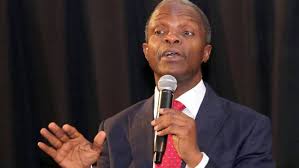Nigeria’s Vice President, Prof. Yemi Osinbajo, has said that the Federal Government will need over $410 billion to successfully implement its Energy Transition Plan 2060, a roadmap to tackle the dual crises of energy poverty and climate change
The Senior Special Assistant, Media & Publicity, to the Vice President, Laolu Akande, in a statement on Wednesday, quoted him as making this disclosure at the global virtual inauguration of Nigeria’s Energy Transition Plan.
While highlighting the significant resources needed to address the dual crises of energy poverty and climate change in the country, Osinbajo pointed out that Africa’s increasing energy gap required collaboration to take ownership of the continent’s transition pathways and the action should be decisive and urgent.
He elaborated: “For Africa, the problem of energy poverty is as important as our climate ambitions.
Energy use is crucial for almost every conceivable aspect of development; wealth, health, nutrition, water, infrastructure, education, and life expectancy are significantly related to the consumption of energy per capita.
“Nigeria would need to spend 410 billion dollars above business-as-usual spending to deliver our transition plan by 2060, which translates to about 10 billion dollars per year.The average 3 billion dollars per year investments in renewable energy recorded for the whole of Africa between 2000 and 2020 will certainly not suffice”, the Vice President added.
Osinbajo, who is also the chairman of the Inter-ministerial Energy Transition Implementation Working Group, hinted that the group was currently engaging with partners to secure an initial $10 billion support package ahead of COP27 along the lines of the South African Just Energy Transition Partnership announced at COP26 in Glasgow.
Commenting on the increasingly worrisome negative effects of climate change in Africa, Osinbajo lamented that climate change was threatening crop productivity in regions that were already food insecure, thereby exacerbating the unemployment levels in the affected countries.
He clarified: “It is certainly time for decisive action, and we just cannot afford to delay; African nations are rising to the challenge; all African countries have signed the Paris Agreement and some countries, South Africa, Sudan, Angola, and Nigeria have also announced net-zero targets.
“The current lack of power hurts livelihoods and destroys the dreams of hundreds of millions of young people. And although Africa’s current unmet energy needs are huge, future demand will be even greater due to expanding populations, urbanization, and movement into the middle class.
“It is clear that the continent must address its energy constraints and would require external support and policy flexibility to deliver this. Unfortunately, in the wider responses to the climate crisis, we are not seeing careful consideration and acknowledgement of Africa’s aspirations”, the Vice President added.
On other aspirations of the Energy Transition Plan roadmap, Osinbajo said that the plan had the potential to create about 340,000 jobs by 2030, and 840,000 by 2060 and opportunity for the country
achieve low-carbon and rapid development model in Africa’s largest economy.
In his remarks at the virtual event, Nigeria Country Director for the World Bank Group, Mr Shubham Chaudhuri, disclosed that multilateral finance institution planned to commit over $1.5 billion towards the Energy Transition Plan on renewable energy, power sector reforms, clean cooking, and other intervention areas.
Participants at the forum include the representatives of the United Nations, Sustainable Energy for All, African Development Bank, IRENA, The Rockefeller Foundation,the Global Energy Alliance for People and Planet, amongst others






